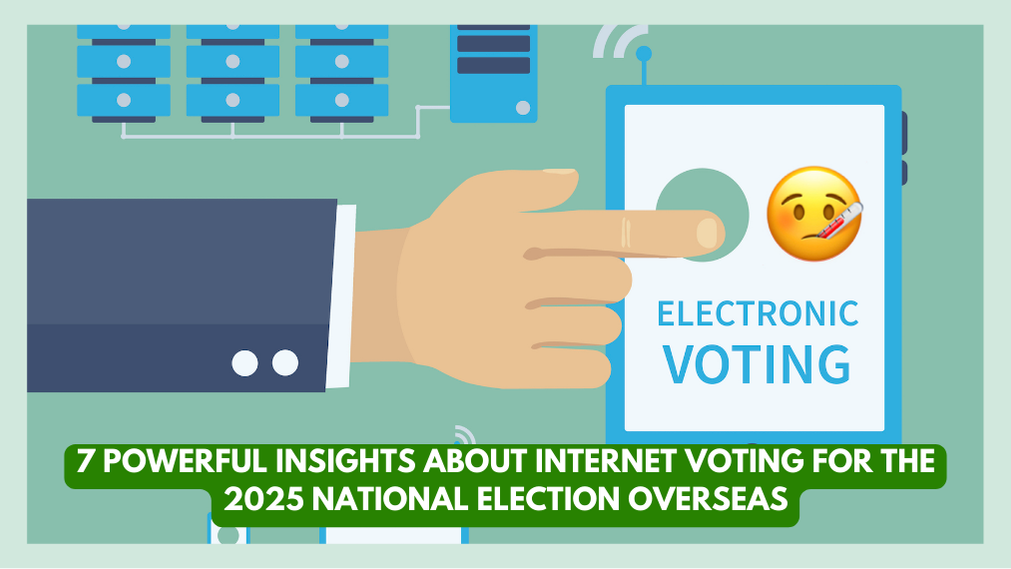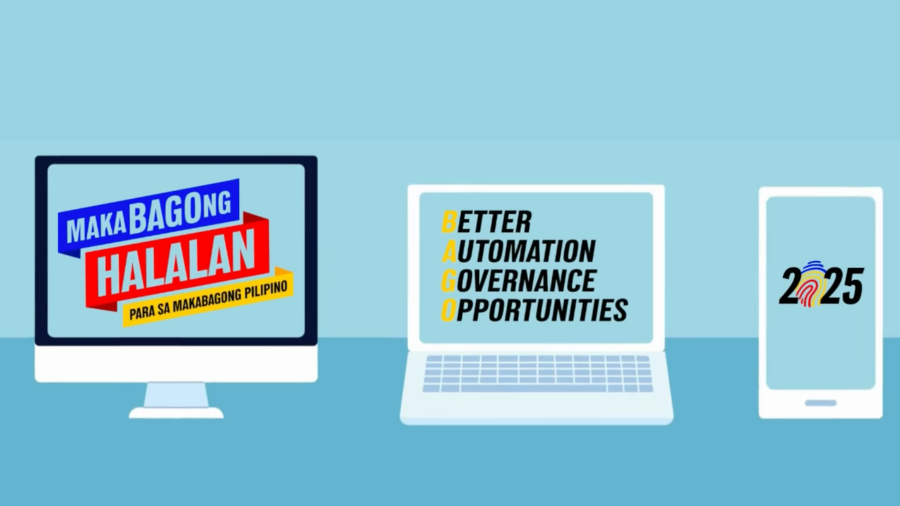No products in the cart.
Abroad, Advocacy, Filipino, Philippines
7 Powerful Insights About Internet Voting for the 2025 National Election Overseas

Introduction
The 2025 National Election Overseas marks a significant milestone in the advancement of digital democracy, offering Internet Voting as an alternative to traditional voting methods. Internet Voting provides a secure, accessible, and efficient way for overseas voters to exercise their democratic rights without the need to visit polling stations. This article explores everything you need to know about Internet Voting, from eligibility and pre-enrollment to the actual voting process.
With millions of overseas Filipinos working in various parts of the world, ensuring their participation in national elections is critical for an inclusive democracy. Traditionally, overseas voting involved either visiting designated embassies or mailing ballots, both of which posed logistical challenges. The introduction of Internet Voting aims to streamline the voting process, making it more convenient, efficient, and secure.
What is Internet Voting?
Internet Voting refers to the digital method of casting votes using the Online Voting and Counting System (OVCS). This system allows registered overseas voters to participate in elections using any electronic device equipped with a camera and an internet connection. The OVCS is compatible with various operating systems, including Android, iOS, Windows, and MacOS, and works on all major web browsers such as Chrome, Firefox, Safari, and Edge. To ensure a smooth voting experience, voters are encouraged to update their software to the latest version.
Internet Voting is designed to increase voter turnout, reduce costs associated with traditional voting methods, and mitigate risks such as ballot tampering and loss of votes due to mailing delays. The OVCS incorporates multiple layers of security, including encryption, biometric verification, and real-time monitoring, to protect the integrity of the voting process. Additionally, it eliminates the need for physical polling stations, making it easier for Filipinos working in remote areas to participate in elections.
Benefits of Internet Voting
Internet Voting offers several benefits compared to traditional voting methods. Some of these include:
- Convenience: Voters can cast their ballots from anywhere in the world without the need to visit embassies or consulates.
- Increased voter participation: Many overseas voters find it difficult to participate in elections due to work schedules or travel constraints. Internet Voting removes these barriers, encouraging greater participation.
- Enhanced security: With encryption, multi-factor authentication, and real-time monitoring, OVCS ensures that votes are protected from tampering.
- Cost efficiency: Internet Voting reduces the costs associated with printing, mailing, and maintaining polling stations.
- Reduced risk of fraud: Traditional mail-in ballots are susceptible to loss or fraud, whereas Internet Voting provides secure, verifiable methods of voting.
- Accessibility: Internet Voting provides an alternative for individuals who may have difficulty visiting polling stations due to disabilities or other constraints

Voting Period for the 2025 National Election Overseas
The Internet Voting period spans thirty (30) continuous calendar days:
- Start Date: 8:00 AM, April 13, 2025 (Sunday), Kuwait local time
- End Date: 7:00 PM, May 12, 2025 (Monday), Philippine local time
Even if the voting period falls on public holidays in either the Philippines or Kuwait, voters can still cast their ballots. Additionally, Overseas Online Voters (OOV) who are logged into the voting portal at the closing time on May 12, 2025, will be granted an extra fifteen (15) minutes to submit their votes before automatic logout.
The extended voting period allows for flexibility, ensuring that voters across different time zones have ample opportunity to participate. Moreover, with the convenience of Internet Voting, voters can cast their ballots from anywhere, eliminating the need to travel to embassies or consulates.
Who is Eligible for Internet Voting?
To participate in Internet Voting, overseas voters must meet the following criteria:
- Be registered as an overseas voter in Kuwait with an active status.
- Pre-enroll through the OVCS before the voting period.
- Provide a valid ID and undergo a live photo capture.
- Ensure that the submitted information matches the Certified List of Overseas Voters (CLOV).
Additionally, the following categories of overseas voters can access Voting Kiosks at the Embassy for a more guided voting experience:
- Pregnant voters
- Senior citizens
- Persons with disabilities (PWDs)
- Illiterate voters
These provisions ensure that Internet Voting remains inclusive and accessible to all eligible voters, regardless of their physical condition or digital literacy.
Here is also a list of ceritfied overseas voters in Kuwait
Pre-Enrollment Procedures
Pre-enrollment will start on March 10, 2025 (Monday) and end on May 12, 2025 (Monday) before the closing of polls in Philippine Standard Time (PST).
To pre-enroll, follow these steps:
- Register using your email address or mobile number and a password.
- Fill out the Internet Voting Enrollment Form with accurate details.
- Receive a ONE-TIME PASSWORD (OTP) via email or SMS and submit the form.
- Begin the identification process by capturing your facial image in the system.
- Take a clear photo of your chosen ID card (Philippine Passport, Driver’s License, Seaman’s Book, or PhilSys ID).
- The system will record a video of you displaying your ID for verification.
- Upon successful validation, you will receive a notification to access the Login Voting Portal via email or SMS.
Online Test Voting
It is recommended to familiarize yourself with the voting process. Online Test Voting will be available after pre-enrollment and before the actual voting period.
- Test Voting Period: March 10, 2025 (Monday) to April 12, 2025 (Saturday)
- Allows voters to practice before actual voting.
- Test site will be disabled when actual voting starts on April 13, 2025.

Actual Online Voting
- Log in to the voting portal using the credentials created during pre-enrollment.
- Select your preferred candidates and answer ballot questions.
- Review and edit selections before finalizing.
- Encrypt your ballot through the OVCS system.
- Receive a unique tracker ID for verification.
- Cast your ballot and confirm registration.
List of Philippine Embassies and Consulates Facilitating Internet Voting
To participate in Internet Voting, voters must be listed under one of the 77 Philippine embassies or consulates that will facilitate Internet Voting. Below is the list of embassies and consulates by region:
Asia Pacific
- Bangkok PE
- Brunei PE
- Canberra PE
- Dhaka PE
- Hanoi PE
- Hong Kong PCG
- Islamabad PE
- Jakarta PE
- Kuala Lumpur PE
- Macau PCG
- Manado PCG
- MECO Kaohsiung
- MECO Taichung
- MECO Taipei
- Melbourne PCG
- Nagoya PCG
- New Delhi PE
- Osaka PCG
- Phnom Penh PE
- Seoul PE
- Singapore PE
- Sydney PCG
- Tokyo PE
- Vientiane PE
- Wellington PE
Europe
- Athens PE
- Barcelona PCG
- Berlin PE
- Berne PE
- Brussels PE
- Budapest PE
- Copenhagen PE
- Frankfurt PCG
- Geneva PM
- Lisbon PE
- London PE
- Madrid PE
- Milan PCG
- Oslo PE
- Paris PE
- Prague PE
- Rome PE
- Stockholm PE
- The Hague PE
- Vatican PE
- Vienna PE
- Warsaw PE
Middle East and Africa
- Abu Dhabi PE
- Amman PE
- Cairo PE
- Doha PE
- Dubai PE
- Jeddah PCG
- Kuwait PE
- Manama PE
- Muscat PE
- Nairobi PE
- Pretoria PE
- Rabat PE
- Riyadh PE
- Tel Aviv PE
North and Latin Americas
- Agana PCG
- Brasilia PE
- Buenos Aires PE
- Calgary PCG
- Chicago PCG
- Honolulu PCG
- Houston PCG
- Los Angeles PCG
- Mexico PE
- New York PCG
- Ottawa PE
- San Francisco PCG
- Santiago PE
- Toronto PCG
Security Measures and Data Protection in Internet Voting
Security is one of the most significant concerns in Internet Voting. The Philippine Commission on Elections (COMELEC) has implemented several security measures to ensure the safety and confidentiality of votes cast online. These measures include:
- End-to-end encryption: All votes are encrypted to prevent tampering or unauthorized access.
- Biometric verification: Voters must verify their identity using facial recognition or other biometric data.
- Multi-factor authentication: A combination of passwords, OTPs (one-time passwords), and biometric verification ensures that only the registered voter can access the voting portal.
- Audit logs: Every action performed within the system is recorded to ensure transparency and accountability.
- Tamper-proof voting records: Once a vote has been cast, it is permanently recorded and cannot be altered, ensuring integrity.
By implementing these security measures, Internet Voting aims to provide the highest level of security while maintaining ease of access for voters worldwide.
Challenges and Concerns Regarding Internet Voting
Despite its many advantages, Internet Voting also presents some challenges and concerns. These include:
- Cybersecurity Risks: Online systems are susceptible to hacking, phishing attacks, and data breaches. Ensuring robust security measures is crucial to maintaining voter confidence.
- Digital Divide: Not all overseas voters may have access to the necessary technology or stable internet connections to participate in Internet Voting.
- Voter Authentication: Ensuring that the right person is casting the vote is a key challenge. Biometric verification and multi-factor authentication help address this issue.
- Technical Glitches: Internet Voting systems may encounter unexpected downtimes, requiring contingency plans to prevent disenfranchisement.
To mitigate these risks, the OVCS employs advanced security protocols, continuous system monitoring, and contingency measures to ensure a smooth voting experience.
How Internet Voting is Changing the Electoral Landscape
The introduction of Internet Voting marks a shift in how democratic elections are conducted. It provides an unprecedented level of accessibility and inclusivity, particularly for overseas voters who might otherwise struggle to participate in elections. With the evolution of digital governance, online voting may become the norm for future elections, ensuring that every eligible citizen has an opportunity to make their voice heard.
Moreover, Internet Voting serves as an example of how technology can be harnessed to improve governance and electoral integrity. It demonstrates a commitment to modernization and inclusivity, paving the way for a more democratic society.

Conclusion
The 2025 National Election Overseas introduces Internet Voting as a groundbreaking step toward democratic inclusivity and technological advancement. By following the pre-enrollment procedures, familiarizing yourself with test voting, and casting your vote during the designated period, you can ensure that your voice is heard in shaping the future of the Philippines.
The shift to Internet Voting not only modernizes the electoral process but also enhances accessibility for millions of overseas voters. As technology continues to evolve, digital voting platforms like OVCS will play a vital role in strengthening democracy and ensuring fair elections for all.
If you like reading this, please like and share my page, DIARYNIGRCIA PAGE.
Questions or suggestions, send them to diarynigracia@gmail.com
You may also follow my Instagram account featuring microliterature, visit DIARYNIGRACIA INSTAGRAM.
READ MORE ABOUT TSOK AND PPO!
Miss Kasambahay International 2024: A Pageant For Domestic Helpers Around the World
12 Inspiring Awards of the Gabi ng Parangal: Gala Night 2024 – Celebrating Excellence and Dedication
Celebrating the Success of the Online Oath-taking for Professional Teachers: The 6 Key Highlights

Peace and love to you.